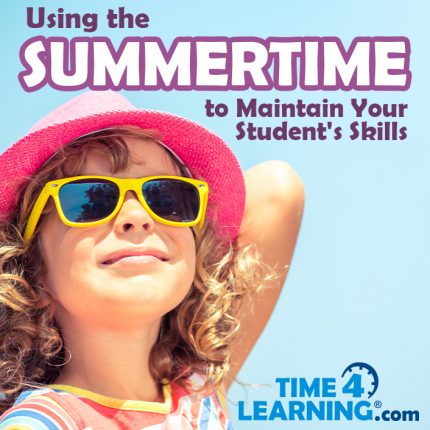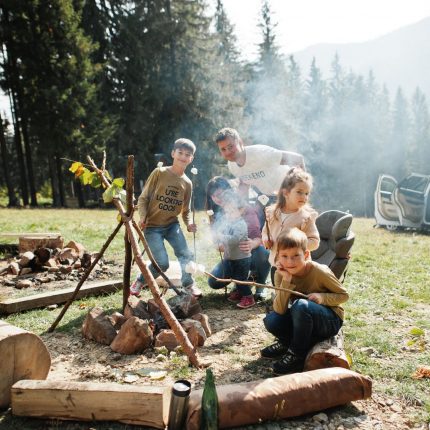
Using the Summertime to Maintain Your Student’s Skills
May 20, 2020This post is sponsored by Time4Learning.com
“To break or not to break…. That is the question.” As we approach the summer months, and our thoughts turn to outside activities and relaxation, school may be far from our minds. However, as homeschoolers, we also want to do what is best for our children’s education. Should summer be a much-needed break from academics, or should we purposely include academic activities for our children during the summer in order to maintain skills?
“Summer slide” is a term that refers to the loss of academic skills over a large break like summer vacation. However, there is a lot of controversy about the term and whether the impacts are as large as some educators claim. Some ask whether any skills that were lost were really learned in the first place. Some argue that real learning occurs during the summer when the focus is on life and not school. Some argue that adults don’t lose all of their skills when they graduate and move into the workforce, but there is also some evidence that at least certain skills can decrease over long breaks. Let’s just pause for a moment to think about the “summer slide.”
What Does Summer Slide Affect?
Research studies are inconsistent but together suggest that general academics increase in some areas while potentially decreasing in others over the summer. For example, reading ability may stay the same or actually increase over the summer. Could that be because students have more time to read and can choose what they want to read during those months?
On the other hand, math calculation (i.e., adding, subtracting, multiplying, and dividing) tends to decrease without practice over the summer while math reasoning (e.g., concepts and application) may actually increase quite a bit. If there is a slide, how long does it take to regain lost skills? Some studies show that summer slide losses can be regained in as little as two weeks.
The bottom line, then, is that skills that require rote memory—like math facts—may decline without rehearsal over a long break while students are less likely to “forget” how to read or how to think about math. As adults, we know how difficult it is to remember a foreign language that we haven’t used in a while. Our memory of the language does come back when we travel to a country that uses that language but getting it back does take some time. Perhaps we can think about the summer slide in the same way.
What if we give ourselves the opportunity to enjoy summer break guilt-free but pull in skill practice in fun ways if we can. Particularly if our children struggle in an area, brief periods of practice may keep learning fresh and avoid a couple of weeks of “rewind” at the start of the next school year. The important part, though, is that anything we do to maintain skills must not feel like more school. “Refresh” activities must not be long, and it must not be boring. Be creative!
To help you out, here are some ideas for how to maintain some academic skills while having fun in the summer:
Maintaining ELA Skills in the Summer
ELA skills can be strengthened simply by informally interacting with our children. The more we listen and speak to them, the better their vocabularies, background knowledge, etc. become. Words everywhere, and simply exposing children to text over the summer can benefit reading skills. Writing may be a little more difficult to build in naturally, but it is possible. Here are some ideas for how to purposely embed ELA skills into your active summer days:
- Decoding: Have your child jump around on index cards labeled with upper-case and lower-case letters to review letter names/sounds for five minutes a day; play “Going on a picnic” with a ball toss to practice initial sounds.
- Reading: Join your child in reading for fun (outside, if possible) because the more you read, the better you read (i.e., the “Matthew Effect”); allow your child’s choice in what to read and accept if your child chooses graphic novels or even texts below his/her reading level; find brief reading opportunities for your child like reading a newspaper article, reading a recipe, or reading about a summer activity you are planning to do.
- Spelling: Ask your child to write grocery lists; write words together with sidewalk chalk in the driveway; play spelling games (e.g., Scrabble or Bananagrams) as a family on a rainy day.
- Writing: Have your child reflect or capture the day’s events in a journal each day (maybe illustrated!); make sentences with magnetic words on the refrigerator (write back and forth with each other); or arrange a pen pal for your child.
Maintaining Math Skills in the Summer
Math, on the other hand, is something that just might not happen naturally in the summer unless you, as the parent, purposely embed activities. Here are some suggestions:
- Math Facts: Post math facts around the house or yard and ask your child to read them each time he/she finds them (you can even do a scavenger hunt!); play catch while rehearsing math facts; run math sprints with your child answering math facts at each end; try Time4MathFacts, online math fact mastery games.
- Math Problems: Have your child do a daily math problem on a whiteboard on your refrigerator each morning to review the types of problems learned during the previous school year.
- Fractions: Practice fractions while cooking (even doubling recipes or doing 1 ½ times a recipe); play with fractions while eating a pizza or cake; use measuring cups in a sandbox or at the beach.
- Money: Have your child calculate unit rates (is it cheaper to buy in bulk?) or sale prices at a grocery store, pay and calculate expected change, or figure out tips at a restaurant.
Maintaining Content Area Skills in the Summer
Beyond ELA and math, there are many ways to keep the learning going through the summer. Summer can be a wonderful time to build background knowledge, especially in social studies and science. If you can take a summer vacation, make a part of it a learning activity like a museum or a zoo/aquarium. Here are a few ideas even if you are spending the summer at home:
- Social Studies: Debate a current event/topic at mealtime; simulate a map of the state, country, continent, or world on the lawn and have your child run from one city/country to another.
- Science: Find a natural space to explore; ask a question about the outdoors and follow the scientific method; have your child observe a natural scene (even at night through a telescope) and describe it to you in detail.
Regardless of where you stand on the “to break or not to break” question, learning does occur during the summer. If you can incorporate some fun activities that will maintain skills related to rote memory, why not? But remember that they have to be fun!
Source:
Gray, P. (2017). Facts and fiction about the so-called “summer slide”: Do children really learn less during summer vacation? Less of what? Psychology Today. Retrieved from https://www.psychologytoday.com/us/blog/freedom-learn/201707/facts-and-fiction-about-the-so-called-summer-slide
Latest Posts

As homeschooling continues to grow in popularity, more parents are taking on the challenge of providing a comprehensive education that not only meets academic standards but also prepares their…
Read more >
June has come and gone, and summer is in full swing! Whether you're traveling this summer or staying close to home, we hope you're enjoying this time with your family. We wanted this month's…
Read more >
Summer is an all-around favorite season for most people. In the U.S., it’s even more exciting for many of us since we get to celebrate Independence Day! The Fourth of July is a wonderful…
Read more >

